- Home
- E. F. Benson
The Second E. F. Benson Megapack
The Second E. F. Benson Megapack Read online
COPYRIGHT INFO
The Second E.F. Benson Megapack is copyright © 2013 by Wildside Press LLC.
A NOTE FROM THE PUBLISHER
Over the last year, our “Megapack” series of ebook anthologies has proved to be one of our most popular endeavors. (Maybe it helps that we sometimes offer them as premiums to our mailing list!) One question we keep getting asked is, “Who’s the editor?”
The Megapacks (except where specifically credited) are a group effort. Everyone at Wildside works on them. This includes John Betancourt, Carla Coupe, Steve Coupe, Bonner Menking, Colin Azariah-Kribbs, A.E. Warren, and many of Wildside’s authors…who often suggest stories to include (and not just their own!).
A NOTE FOR KINDLE READERS
The Kindle versions of all of our Megapacks employ active tables of contents for easy navigation…please look for one before writing reviews on Amazon that complain about the lack! (They are sometimes at the ends of ebooks, depending on your reader.)
RECOMMEND A FAVORITE STORY?
Do you know a great classic science fiction story, or have a favorite author whom you believe is perfect for the Megapack series? We’d love your suggestions! You can post them on our message board at http://movies.ning.com/forum (there is an area for Wildside Press comments).
Note: we only consider stories that have already been professionally published. This is not a market for new works.
TYPOS
Unfortunately, as hard as we try, a few typos do slip through. We update our ebooks periodically, so make sure you have the current version (or download a fresh copy if it’s been sitting in your ebook reader for months.) It may have already been updated.
If you spot a new typo, please let us know. We’ll fix it for everyone. You can email the publisher at [email protected] or use the message boards above.
—John Betancourt
Publisher, Wildside Press LLC
www.wildsidepress.com
THE MEGAPACK SERIES
The Adventure Megapack
The Christmas Megapack
The Second Christmas Megapack
The Cowboy Megapack
The Craig Kennedy Scientific Detective Megapack
The Cthulhu Mythos Megapack
The Ghost Story Megapack
The Horror Megapack
The Macabre Megapack
The Martian Megapack
The Military Megapack
The Mummy Megapack
The Mystery Megapack
The Science Fiction Megapack
The Second Science Fiction Megapack
The Third Science Fiction Megapack
The Fourth Science Fiction Megapack
The Fifth Science Fiction Megapack
The Sixth Science Fiction Megapack
The Penny Parker Megapack
The Pinocchio Megapack
The Pulp Fiction Megapack
The Rover Boys Megapack
The Steampunk Megapack
The Tom Corbett, Space Cadet Megapack
The Tom Swift Megapack
The Vampire Megapack
The Victorian Mystery Megapack
The Werewolf Megapack
The Western Megapack
The Wizard of Oz Megapack
AUTHOR MEGAPACKS
The B.M. Bower Megapack
The E.F. Benson Megapack
The Second E.F. Benson Megapack
The Wilkie Collins Megapack
The Randall Garrett Megapack
The G.A. Henty Megapack
The Murray Leinster Megapack
The Second Murray Leinster Megapack
The Andre Norton Megapack
The Rafael Sabatini Megapack
THE OUTCAST
When Mrs. Acres bought the Gate-house at Tarleton, which had stood so long without a tenant, and appeared in that very agreeable and lively little town as a resident, sufficient was already known about her past history to entitle her to friendliness and sympathy. Hers had been a tragic story, and the account of the inquest held on her husband’s body, when, within a month of their marriage, he had shot himself before her eyes, was recent enough, and of as full a report in the papers as to enable our little community of Tarleton to remember and run over the salient grimness of the case without the need of inventing any further details—which, otherwise, it would have been quite capable of doing.
Briefly, then, the facts had been as follows. Horace Acres appeared to have been a heartless fortune-hunter—a handsome, plausible wretch, ten years younger than his wife. He had made no secret to his friends of not being in love with her but of having a considerable regard for her more than considerable fortune. But hardly had he married her than his indifference developed into violent dislike, accompanied by some mysterious, inexplicable dread of her. He hated and feared her, and on the morning of the very day when he had put an end to himself he had begged her to divorce him; the case he promised would be undefended, and he would make it indefensible. She, poor soul, had refused to grant this; for, as corroborated by the evidence of friends and servants, she was utterly devoted to him, and stated with that quiet dignity which distinguished her throughout this ordeal, that she hoped that he was the victim of some miserable but temporary derangement, and would come to his right mind again. He had dined that night at his club, leaving his month-old bride to pass the evening alone, and had returned between eleven and twelve that night in a state of vile intoxication. He had gone up to her bedroom, pistol in hand, had locked the door, and his voice was heard screaming and yelling at her. Then followed the sound of one shot. On the table in his dressing-room was found a half-sheet of paper, dated that day, and this was read out in court. “The horror of my position,” he had written, “is beyond description and endurance. I can bear it no longer: my soul sickens.…” The jury, without leaving the court, returned the verdict that he had committed suicide while temporarily insane, and the coroner, at their request, expressed their sympathy and his own with the poor lady, who, as testified on all hands, had treated her husband with the utmost tenderness and affection.
For six months Bertha Acres had travelled abroad, and then in the autumn she had bought Gate-house at Tarleton, and settled down to the absorbing trifles which make life in a small country town so busy and strenuous.
* * * *
Our modest little dwelling is within a stone’s throw of the Gate-house; and when, on the return of my wife and myself from two months in Scotland, we found that Mrs. Acres was installed as a neighbour, Madge lost no time in going to call on her. She returned with a series of pleasant impressions. Mrs. Acres, still on the sunny slope that leads up to the tableland of life which begins at forty years, was extremely handsome, cordial, and charming in manner, witty and agreeable, and wonderfully well dressed. Before the conclusion of her call Madge, in country fashion, had begged her to dispose with formalities, and, instead of a frigid return of the call, to dine with us quietly next day. Did she play bridge? That being so, we would just be a party of four; for her brother, Charles Alington, had proposed himself for a visit.…
I listened to this with sufficient attention to grasp what Madge was saying, but what I was really thinking about was a chess-problem which I was attempting to solve. But at this point I became acutely aware that her stream of pleasant impressions dried up suddenly, and she became stonily silent. She shut speech off as by the turn of a tap, and glowered at the fire, rubbing the back of one hand with the fingers of another, as is her habit in perplexity.
“Go on,” I said.
She got up, suddenly restless.
“All I have been telling you is literally and soberly true,” she said. “I thought Mrs. Acres charming and witty and good-looking and
friendly. What more could you ask from a new acquaintance? And then, after I had asked her to dinner, I suddenly found for no earthly reason that I very much disliked her; I couldn’t bear her.”
“You said she was wonderfully well dressed,” I permitted myself to remark.… If the Queen took the Knight—
“Don’t be silly!” said Madge. “I am wonderfully well dressed too. But behind all her agreeableness and charm and good looks I suddenly felt there was something else which I detested and dreaded. It’s no use asking me what it was, because I haven’t the slightest idea. If I knew what it was, the thing would explain itself. But I felt a horror—nothing vivid, nothing close, you understand, but somewhere in the background. Can the mind have a ‘turn,’ do you think, just as the body can, when for a second or two you suddenly feel giddy? I think it must have been that—oh! I’m sure it was that. But I’m glad I asked her to dine. I mean to like her. I shan’t have a ‘turn’ again, shall I?”
“No, certainly not,” I said.… If the Queen refrained from taking the tempting Knight—
“Oh, do stop your silly chess-problem!” said Madge. “Bite him, Fungus!”
Fungus, so called because he is the son of Humour and Gustavus Adolphus, rose from his place on the hearth-rug, and with a horse laugh nuzzled against my leg, which is his way of biting those he loves. Then the most amiable of bull-dogs, who has a passion for the human race, lay down on my foot and sighed heavily. But Madge evidently wanted to talk, and I pushed the chessboard away.
“Tell me more about the horror,” I said.
“It was just horror,” she said—“a sort of sickness of the soul.…”
I found my brain puzzling over some vague reminiscence, surely connected with Mrs. Acres, which those words mistily evoked. But next moment that train of thought was cut short, for the old and sinister legend about the Gate-house came into my mind as accounting for the horror of which Madge spoke. In the days of Elizabethan religious persecutions it had, then newly built, been inhabited by two brothers, of whom the elder, to whom it belonged, had Mass said there every Sunday. Betrayed by the younger, he was arrested and racked to death. Subsequently the younger, in a fit of remorse, hanged himself in the panelled parlour. Certainly there was a story that the house was haunted by his strangled apparition dangling from the beams, and the late tenants of the house (which now had stood vacant for over three years) had quitted it after a month’s occupation, in consequence, so it was commonly said, of unaccountable and horrible sights. What was more likely, then, than that Madge, who from childhood has been intensely sensitive to occult and psychic phenomena, should have caught, on that strange wireless receiver which is characteristic of “sensitives,” some whispered message?
“But you know the story of the house,” I said. “Isn’t it quite possible that something of that may have reached you? Where did you sit, for instance? In the panelled parlour?”
She brightened at that.
“Ah, you wise man!” she said. “I never thought of that. That may account for it all. I hope it does. You shall be left in peace with your chess for being so brilliant.”
* * * *
I had occasion half an hour later to go to the post-office, a hundred yards up the High Street, on the matter of a registered letter which I wanted to despatch that evening. Dusk was gathering, but the red glow of sunset still smouldered in the west, sufficient to enable me to recognise familiar forms and features of passers-by. Just as I came opposite the post-office there approached from the other direction a tall, finely built woman, whom, I felt sure, I had never seen before. Her destination was the same as mine, and I hung on my step a moment to let her pass in first. Simultaneously I felt that I knew, in some vague, faint manner, what Madge had meant when she talked about a “sickness of the soul.” It was no nearer realisation to me than is the running of a tune in the head to the audible external hearing of it, and I attributed my sudden recognition of her feeling to the fact that in all probability my mind had subconsciously been dwelling on what she had said, and not for a moment did I connect it with any external cause. And then it occurred to me who, possibly, this woman was.…
She finished the transaction of her errand a few seconds before me, and when I got out into the street again she was a dozen yards down the pavement, walking in the direction of my house and of the Gate-house. Opposite my own door I deliberately lingered, and saw her pass down the steps that led from the road to the entrance of the Gate-house. Even as I turned into my own door the unbidden reminiscence which had eluded me before came out into the open, and I cast my net over it. It was her husband, who, in the inexplicable communication he had left on his dressing-room table, just before he shot himself, had written “my soul sickens.” It was odd, though scarcely more than that, for Madge to have used those identical words.
* * * *
Charles Alington, my wife’s brother, who arrived next afternoon, is quite the happiest man whom I have ever come across. The material world, that perennial spring of thwarted ambition, physical desire, and perpetual disappointment, is practically unknown to him. Envy, malice, and all uncharitableness are equally alien, because he does not want to obtain what anybody else has got, and has no sense of possession, which is queer, since he is enormously rich. He fears nothing, he hopes for nothing, he has no abhorrences or affections, for all physical and nervous functions are in him in the service of an intense inquisitiveness. He never passed a moral judgment in his life, he only wants to explore and to know. Knowledge, in fact, is his entire preoccupation, and since chemists and medical scientists probe and mine in the world of tinctures and microbes far more efficiently than he could do, as he has so little care for anything that can be weighed or propagated, he devotes himself, absorbedly and ecstatically, to that world that lies about the confines of conscious existence. Anything not yet certainly determined appeals to him with the call of a trumpet: he ceases to take an interest in a subject as soon as it shows signs of assuming a practical and definite status. He was intensely concerned, for instance, in wireless transmission, until Signor Marconi proved that it came within the scope of practical science, and then Charles abandoned it as dull. I had seen him last two months before, when he was in a great perturbation, since he was speaking at a meeting of Anglo-Israelites in the morning, to show that the Scone Stone, which is now in the Coronation Chair at Westminster, was for certain the pillow on which Jacob’s head had rested when he saw the vision at Bethel; was addressing the Psychical Research Society in the afternoon on the subject of messages received from the dead through automatic script, and in the evening was, by way of a holiday, only listening to a lecture on reincarnation. None of these things could, as yet, be definitely proved, and that was why he loved them. During the intervals when the occult and the fantastic do not occupy him, he is, in spite of his fifty years and wizened mien, exactly like a schoolboy of eighteen back on his holidays and brimming with superfluous energy.
I found Charles already arrived when I got home next afternoon, after a round of golf. He was betwixt and between the serious and the holiday mood, for he had evidently been reading to Madge from a journal concerning reincarnation, and was rather severe to me.…
“Golf!” he said, with insulting scorn. “What is there to know about golf? You hit a ball into the air—”
I was a little sore over the events of the afternoon.
“That’s just what I don’t do,” I said. “I hit it along the ground!”
“Well, it doesn’t matter where you hit it,” said he. “It’s all subject to known laws. But the guess, the conjecture: there’s the thrill and the excitement of life. The charlatan with his new cure for cancer, the automatic writer with his messages from the dead, the reincarnationist with his positive assertions that he was Napoleon or a Christian slave—they are the people who advance knowledge. You have to guess before you know. Even Darwin saw that when he said you could not investigate without a hypothesis!”
“So what’s your hypothesis this m
inute?” I asked.
“Why, that we’ve all lived before, and that we’re going to live again here on this same old earth. Any other conception of a future life is impossible. Are all the people who have been born and have died since the world emerged from chaos going to become inhabitants of some future world? What a squash, you know, my dear Madge! Now, I know what you’re going to ask me. If we’ve all lived before, why can’t we remember it? But that’s so simple! If you remembered being Cleopatra, you would go on behaving like Cleopatra; and what would Tarleton say? Judas Iscariot, too! Fancy knowing you had been Judas Iscariot! You couldn’t get over it! You would commit suicide, or cause everybody who was connected with you to commit suicide from their horror of you. Or imagine being a grocer’s boy who knew he had been Julius Cæsar.… Of course, sex doesn’t matter: souls, as far as I understand, are sexless—just sparks of life, which are put into physical envelopes, some male, some female. You might have been King David, Madge and poor Tony here one of his wives.”
“That would be wonderfully neat,” said I.
Charles broke out into a shout of laughter.
“It would indeed,” he said. “But I won’t talk sense any more to you scoffers. I’m absolutely tired out, I will confess, with thinking. I want to have a pretty lady to come to dinner, and talk to her as if she was just herself and I myself, and nobody else. I want to win two-and-sixpence at bridge with the expenditure of enormous thought. I want to have a large breakfast tomorrow and read The Times afterwards, and go to Tony’s club and talk about crops and golf and Irish affairs and Peace Conferences, and all the things that don’t matter one straw!”
“You’re going to begin your programme tonight, dear,” said Madge. “A very pretty lady is coming to dinner, and we’re going to play bridge afterwards.”
Madge and I were ready for Mrs. Acres when she arrived, but Charles was not yet down. Fungus, who has a wild adoration for Charles, quite unaccountable, since Charles has no feelings for dogs, was helping him to dress, and Madge, Mrs. Acres, and I waited for his appearance. It was certainly Mrs. Acres whom I had met last night at the door of the post-office, but the dim light of sunset had not enabled me to see how wonderfully handsome she was. There was something slightly Jewish about her profile: the high forehead, the very full-lipped mouth, the bridged nose, the prominent chin, all suggested rather than exemplified an Eastern origin. And when she spoke she had that rich softness of utterance, not quite hoarseness, but not quite of the clear-cut distinctness of tone which characterises northern nations. Something southern, something Eastern.…

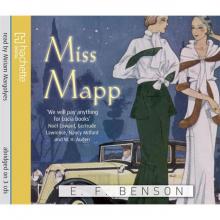 Miss Mapp
Miss Mapp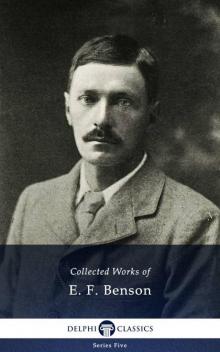 Works of E F Benson
Works of E F Benson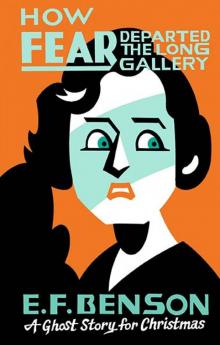 How Fear Departed the Long Gallery
How Fear Departed the Long Gallery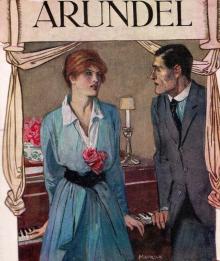 Dodo's Daughter: A Sequel to Dodo
Dodo's Daughter: A Sequel to Dodo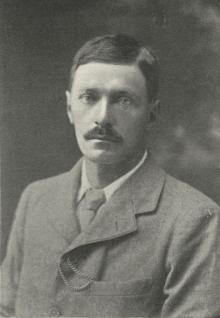 The House of Defence v. 1
The House of Defence v. 1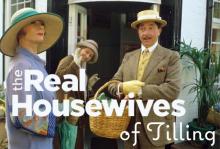 Queen Lucia
Queen Lucia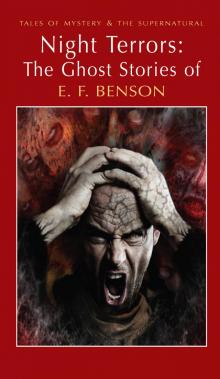 Night Terrors
Night Terrors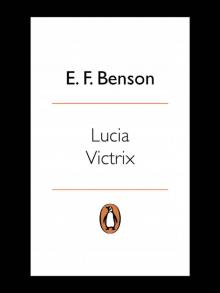 Lucia Victrix
Lucia Victrix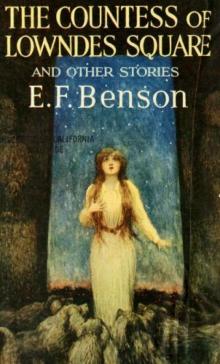 The Countess of Lowndes Square and Other Stories
The Countess of Lowndes Square and Other Stories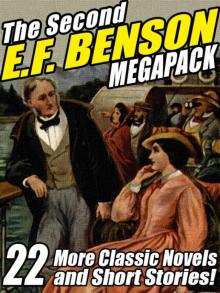 The Second E. F. Benson Megapack
The Second E. F. Benson Megapack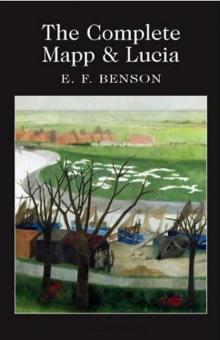 The Complete Mapp & Lucia
The Complete Mapp & Lucia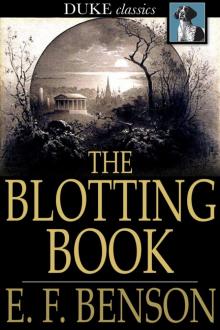 The Blotting Book
The Blotting Book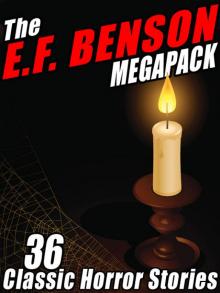 The E. F. Benson Megapack
The E. F. Benson Megapack Lucia Rising
Lucia Rising Ghost Stories
Ghost Stories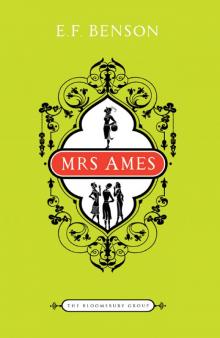 Mrs. Ames
Mrs. Ames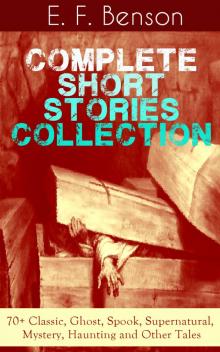 E. F. Benson
E. F. Benson